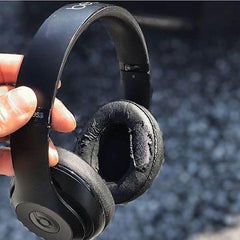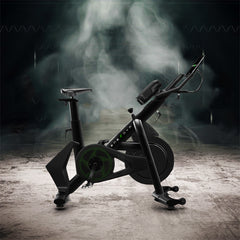5 Ways Coffee Can Help You Smash Your Workout

Coffee is the world’s most commonly used psychoactive drug. Congratulations! You’re a drug addict.
In Britain we drink 95 million cups of coffee each day, so it’s no wonder that we’re scrambling to find benefits to caffeine consumption. Imagine if this stuff was really bad for us. Honestly? You’ll have to pry my six-thirty AM flat white from my cold, dead hands.
Business Insider explains how caffeine manages to work its magic: it literally hijacks the brain’s production of a molecule called adenosine which is released throughout the day to prepare us for sleep later on. Caffeine barrels in and “pushes” adenosine out of the way, keeping us alert and focused until the brain wises up to what’s occurring and starts producing more molecules.
Legend has it that it that coffee was discovered by an Ethiopian goat herder called Kaldi sometime between 900 and 1000 A.D. We have a lot to thank this guy (and his goats) for. Although, in recent years coffee has had something of a bad rap with caffeine being demonised as an anxiety-inducing, ulcer-forming, insomnia manifesting devil’s bean*. Tea has always had good PR in the UK but coffee does have health benefits and studies are showing that when it’s consumed alongside exercise it has some pretty remarkable effects.
*Bigged up, sure, but actually quite true. So don’t think this is your permission to drink one hundred cups a day.
We were interested to find out that until 2004, the World Anti-Doping agency listed caffeine as a prohibited substance. The Chicago Tribune wrote: Caffeine, whether ingested in the form of coffee, cola, cold medication or an ingredient in supplements, was thought to be performance-enhancing in large doses.
It’s strange to think that something as ubiquitous as coffee was banned alongside performance enhancing drugs like steroids and growth hormones. And the best thing about using coffee in your exercise regime is that’s inexpensive and its probably sitting in your kitchen right now.
How Coffee Can Help You Exercise Better

Coffee Helps Boost Metabolism
Okay, there’s a slight clarification needed here. Coffee can help boost metabolism but not if you’re rocking into Starbucks and demanding a coffee loaded with sugar or cream. Anything with crème or frappuccino in the name is going to do the exact opposite of boosting metabolism, so if you're serious about using it to your athletic advantage then stick to espresso, Americano or a flat white.
A study published in the International Journal of Obesity concluded that caffeine could increase metabolism by 4 or 5%. Nutritionist Sarah Flowers told The Express recently that one of the ways coffee helps to boost metabolism is by ‘stimulating thermogenesis’ which helps the body to burn more fat. She goes on to say that ‘coffee also contains Chlorogenic acid, which helps to slow down the absorption of carbohydrates, as well as stimulating the hormone Epinephrine, which helps to break down fat.’
You’re hardly going to win any slimming awards on the basis of caffeine alone BUT it’s pretty awesome to know that something you already enjoy can help maintain your health and fitness even if it’s only in a small way.
Coffee Enhances Performance
If you've ever read the label of a sports supplement, then you've probably noticed that caffeine is often included in the ingredients. During exercise, the body draws on its supply of glycogen, and it’s when this supply is depleted that you’ll start feeling fatigue. Caffeine slows this process down by making the body use fat as fuel and delaying the release and depletion of glycogen. This is pretty handy during endurance events when athletes are expected to perform well for longer periods of time.
Pro Tip: It’s all a matter of timing. Heidi Skolnik, M.S., a sports nutritionist and owner of Nutrition Conditioning, Inc. told The Daily Burn:
It’s hardly surprising that caffeine does boost performance. We’ve already mentioned that it was banned for many years in international competitions, but it was also believed that for caffeine to be truly effective, athletes would have to abstain from it for weeks beforehand. Simply put, it was thought that your body couldn’t benefit from caffeine if it was used to it. But new studies, including one for the Journal of Applied Physiology, suggests that isn’t the case. Everyone can benefit from the performance boosting effects of caffeine, even those who regularly drink coffee.
Coffee Aids Focus During Exercise
This goes without saying, doesn’t it? One of the best examples of how necessary caffeine in particular has become in aiding focus both in and out of the gym is with the rise of the energy drink.
The UK energy drink market is worth £1.65 billion. Red Bull is the biggest
selling energy drink the world, and its tagline “gives you wings” speaks volumes
About why many of us keep drinking something that, quite frankly, tastes like a sweet-tart cough mixture. Although, it does go quite well with vodka. Focus is an integral part of a workout. If we don’t have it, then we can’t give 100%. The great thing about coffee is that it doesn’t have the same amount of sugar or crap in it that energy drinks often do. Which means it’s more likely to appeal to those looking to maintain a cleaner way of drinking and supplementing their exercise. Unless of course, you’re adding sugar and crap to it.
Surprisingly, there’s about the same amount of caffeine in your coffee as in your energy drink but if you’re looking to boost your energy with coffee then Neil Clarke, principal lecturer in Sport and Exercise Science at Coventry University writes in The Conversation, that a dessert spoon of instant coffee granules is probably better than a teaspoon.
Coffee Can Reduce Muscle Pain After Exercise
Coffee consumption pre-workout can help reduce muscle pain during strength exercises, that’s according to a study by Professor Motl from the University of Illinois. In his study, 24 men exercised intensely on bikes and those who had taken a caffeine pill before starting gave a lower score for quadricep pain intensity than those who were given the placebo. Coffee contains Polyphenols along with additional anti-inflammatory compounds writes the Harvard Health website, and there’s evidence, too, that it may protect against acute-age related inflammation linked to cancer and diseases like alzheimer's. You may already know that when paired with caffeine, pain pills like aspirin and ibuprofen provide greater relief.

Coffee Makes You Feel as if Exercise Isn't So bad
This has to be coffee’s greatest gift to us all. We all have shitty workouts from time to time. Some us may even feel as if we have shitty workouts ALL the time, but caffeine can help make a workout feel easier than it is. Now, we’re not suggesting that halfway through a marathon you’re going to start whistling Always Look on the Bright Side of Life BUT the Journal of Applied Psychology published the results of a study where 14 participants had worked out on stationary bikes having first had a couple of cups of coffee. Later, they worked out again without caffeine. The participants said drinking coffee before the workout had made it feel easier than without.
Caffeine is what makes coffee so great at improving athletic performance but it’s coffee that makes it taste palatable (have you ever tried caffeine gum? Eugh) Tea is another topic for another time but, generally speaking, per cup it doesn’t contain as much caffeine as coffee.
Coffee is a simple and affordable way to get the most out of your workout. A while back we wrote about how music can help to enhance athletic performance by up to 15%, so it’s great to know that we can smash a workout without having to invest in tech or expensive supplements.
Grab a coffee and grab your workout playlist but before you hit the gym, remember to add Earhugz sweat-resistant headphone covers to protect your cushions from sweat damage during exercise. If coffee and music are going to make you work harder, then make sure you’re not sacrificing superb sound quality or your premium headphones when you’re doing it.




